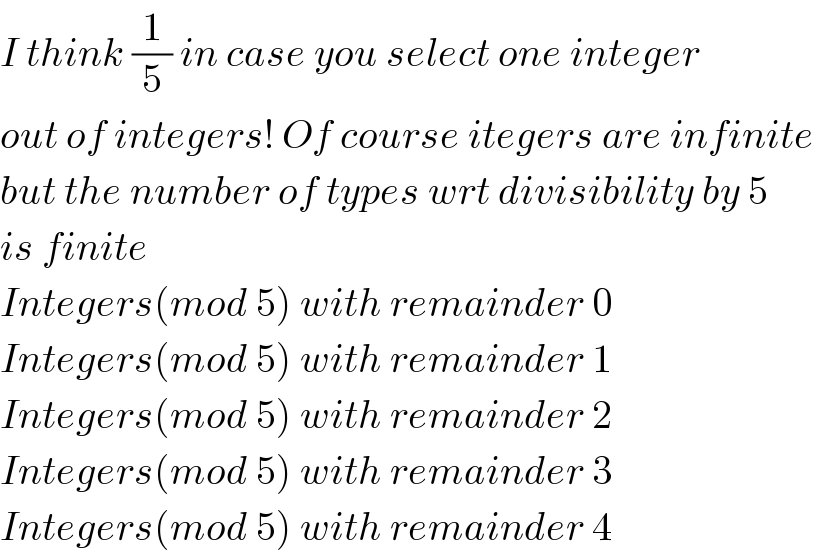
Question Number 3927 by prakash jain last updated on 24/Dec/15

$$\mathrm{5}\:\mathrm{integers}\:\mathrm{are}\:\mathrm{selected}\:\mathrm{randomly}\:\mathrm{from}\:\mathbb{Z}^{+} \\ $$$$\mathrm{what}\:\mathrm{is}\:\mathrm{the}\:\mathrm{probability}\:\mathrm{that}\:\mathrm{at}\:\mathrm{least}\:\mathrm{one} \\ $$$$\mathrm{of}\:\mathrm{them}\:\mathrm{is}\:\mathrm{divisible}\:\mathrm{by}\:\mathrm{5}. \\ $$
Commented by prakash jain last updated on 26/Dec/15

$$\frac{\mathrm{1}}{\mathrm{5}}\:\mathrm{is}\:\mathrm{the}\:\mathrm{probability}\:\mathrm{of}\:\mathrm{one}\:\mathrm{integer}\:\mathrm{being} \\ $$$$\mathrm{divisible}\:\mathrm{by}\:\mathrm{5}. \\ $$$$\mathrm{Probablity}\:\mathrm{of}\:\mathrm{at}\:\mathrm{least}\:\mathrm{one}\:\mathrm{integer}\:\mathrm{being} \\ $$$$\mathrm{divisible}\:\mathrm{by}\:\mathrm{5}=\mathrm{1}−\mathrm{all}\:\mathrm{not}\:\mathrm{divisible}\:\mathrm{by}\:\mathrm{5}. \\ $$$$=\mathrm{1}−\left(\frac{\mathrm{4}}{\mathrm{5}}\right)^{\mathrm{5}} \\ $$
Commented by Filup last updated on 26/Dec/15

$${yes}\:{that}\:{is}\:{what}\:{i}\:{meant} \\ $$
Commented by Filup last updated on 26/Dec/15

$$\:\mathrm{Every}\:\mathrm{1}\:\mathrm{in}\:\mathrm{5}\:\mathrm{sequencial}\:\mathrm{values}\:\mathrm{are} \\ $$$$\mathrm{devisibly}\:\mathrm{by}\:\mathrm{5}. \\ $$$$\mathrm{e}.\mathrm{g}.\:\mathrm{7},\:\mathrm{8},\:\mathrm{9},\:\mathrm{10},\:\mathrm{11} \\ $$$$ \\ $$$${n},\:{x}\in\mathbb{Z}^{+} \\ $$$${S}=\left\{\mathrm{5},\:\mathrm{10},\mathrm{15},\:...\right\} \\ $$$${P}\left({x}\in{S}\right)=\frac{\mathrm{1}}{\mathrm{5}} \\ $$$$ \\ $$$$\mathrm{This}\:\mathrm{could}\:\mathrm{be}\:\mathrm{horribly}\:\mathrm{wrong} \\ $$$$ \\ $$$$\mathrm{i}\:\mathrm{have}\:{assumed}\:\mathrm{0}\notin\mathbb{Z}^{+} \\ $$
Commented by Rasheed Soomro last updated on 26/Dec/15

$${If}\:\:{one}\:{integer}\:{were}\:{to}\:{be}\:{slected}\:{then}? \\ $$
Commented by Rasheed Soomro last updated on 26/Dec/15

$${I}\:{think}\:\frac{\mathrm{1}}{\mathrm{5}}\:{in}\:{case}\:{you}\:{select}\:{one}\:{integer} \\ $$$${out}\:{of}\:{integers}!\:{Of}\:{course}\:{itegers}\:{are}\:{infinite} \\ $$$${but}\:{the}\:{number}\:{of}\:{types}\:{wrt}\:{divisibility}\:{by}\:\mathrm{5} \\ $$$${is}\:{finite} \\ $$$${Integers}\left({mod}\:\mathrm{5}\right)\:{with}\:{remainder}\:\mathrm{0} \\ $$$${Integers}\left({mod}\:\mathrm{5}\right)\:{with}\:{remainder}\:\mathrm{1} \\ $$$${Integers}\left({mod}\:\mathrm{5}\right)\:{with}\:{remainder}\:\mathrm{2} \\ $$$${Integers}\left({mod}\:\mathrm{5}\right)\:{with}\:{remainder}\:\mathrm{3} \\ $$$${Integers}\left({mod}\:\mathrm{5}\right)\:{with}\:{remainder}\:\mathrm{4} \\ $$
Commented by Filup last updated on 26/Dec/15

$${Yes}.\:{Only}\:{if}\:{integer}. \\ $$$$\mathrm{I}{t}\:\mathrm{is}\:\mathrm{out}\:\mathrm{of}\:\mathbb{Z}^{+} \\ $$$$ \\ $$$$\mathrm{If}\:\mathrm{it}\:\mathrm{were}\:\mathrm{out}\:\mathrm{of}\:\mathbb{R}^{+} \:\left(\mathrm{or}\:\mathbb{R}\right), \\ $$$$\mathrm{the}\:\mathrm{probabilty}\:\mathrm{would}\:\mathrm{be}\:\frac{\mathrm{1}}{\infty}=\mathrm{0\%}. \\ $$$$\mathrm{B}{ecause}\:\mathrm{there}\:\mathrm{are}\:\mathrm{infinitly}\:\mathrm{less}\:\mathrm{integers} \\ $$$$\mathrm{than}\:\mathrm{non}-{integers} \\ $$
